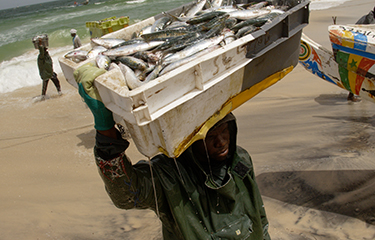The growing fishmeal and fish oil industry in West Africa has mainly supported export market growth, leaving domestic seafood markets with dwindling amounts of fish available for human consumption, environmental degradation, and decreased income for fishers and factory workers in Mauritania and Senegal, according to a new human rights impact assessment.
Senegal and Mauritania account for 1.12 percent and 0.22 percent of global fishmeal and fish oil output, respectively. Commissioned by the Global Roundtable on Marine Ingredients, an initiative co-founded by the IFFO, The Marine Ingredients Organisation and the marine conservation organization Sustainable Fisheries Partnership, the assessment studied the small pelagic value chain in the two countries, finding that the price of fish has skyrocketed in the two countries, forcing local consumers to forego seafood in their diets.
In Mauritania, prices of sardinella have risen in recent years from MRO 100 (USD 0.26, EUR 0.25) per kilogram to MRO 600 (USD 1.60, EUR 1.50), representing “a steep increase for the poorer population in Mauritania who are the consumers of this species,” according to the report.
The increase is due to the fact that more catch continues to go toward the fishmeal and fish oil (FMFO) industry and export markets “as they pay higher prices, leaving the local market poorly supplied,” the report said.
Additionally, fishmeal factories in both countries have employed detrimental environmental practices, such as releasing unregulated emissions and dumping wastewater in the sea, placing local communities, fishers, and factory workers at risk, the report found.
The governments of both countries failed to …
Photo courtesy of Senderistas/Shutterstock








